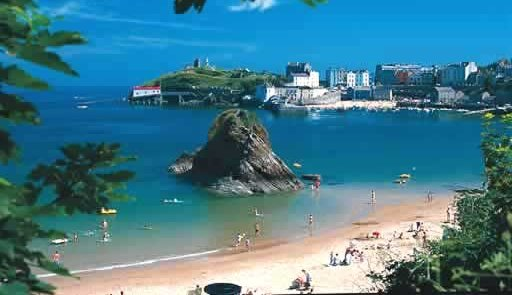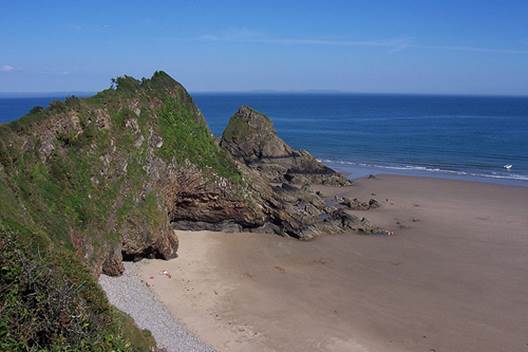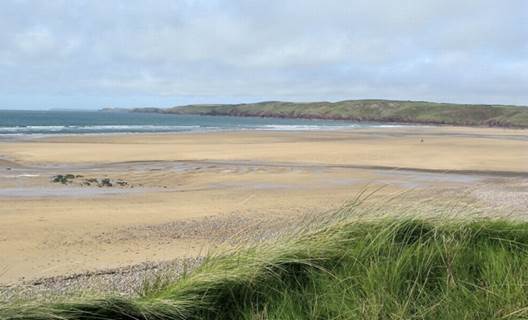We think that Pembrokeshire is one of
the best places in the country to hone your photograph skills. Read on to find
out why…
Pembrokeshire, my home and where I’ve spent
most of my life growing up. Famed for its stunning beaches, seaside villages
and rugged coastline; it’s a holiday hotspot at any time of year. It also
reveals a great amount of history with its vast number of castles, burial chambers
and churches. The main draw to Pembrokeshire is not only the fact it’s
Britain’s only coastal National Park, but that it has fantastic walking
possibilities thanks to its unique coastal path. The Pembrokeshire Coast Path;
now celebrating its sixtieth year, winds its way through one hundred and eighty
six miles of the most breathtaking and stunning coastal scenery in Britain.
Starting at Amroth in the south east of the country and finishing at St.
Dogmaels in the north east, the path encompasses almost every kind of coastal
landscape from rugged stacks, coves and sea cliffs to vast golden beaches
stretching as far as the eye can see. It also displays a wide array of coastal
flora and fauna throughout the seasons. If you walked it all, it’s comparable
to climbing Everest with its ascents and descents equating to thirty five
thousand feet of elevation changes. However, thanks to the way it links up most
towns and villages, it’s much better to complete it in stages, taking your time
and soaking up the magical views along the way. As you can imagine, with the
vast array of different scenes and subjects on offer, it makes my job as a
landscape and wildlife photographer much easier; I say easier, as being
situated next to the Irish Sea, and more importantly the Atlantic Ocean, we
tend to get our fair share of rain. Pembrokeshire has an essentially maritime
climate, so it’s often cloudy, wet, windy and wild, sometimes all at once!
Although misty drizzle and grey skies aren’t the best conditions to show off the
landscape to its best, usually prior or after these weather patterns though,
can produce some rare, but fantastic light. Pembrokeshire has gone great
potential for majestic coastal and inland views for photography, and hopefully
with this brief guide you’ll discover its many charms.

The
idyllic seaside harbour town of Tendy sums up the county’s relationship with
the sea
The Pembrokeshire experience
Pembrokeshire has, and always will be, a
haven for tourists and its variety of coastal destinations for a week or
weekend away are second to none. The seas that surround the coast appear as a
beautiful turquoise blue in the summer months and gazing through the water
whilst out on a walk, you could be fooled into thinking you’re in the Med.
Popular well known tourist spots such as Tenby Harbour, St. Davids Cathedral
and Barafundle Bay tend to sell a rather typical view of what visitors to the
country can expect, but going off the beaten track can reward the landscape
photographer with some fantastic locations; not only being something fresh and
new, but also a scene that hasn’t been shot a thousand times before.

The
rocky outcrops at Monkstone Point isolated at high tide, a perfect location to
catch the sunrise
The main aim for many visiting and resident
photographers is to capture the essence of Pembrokeshire’s unique coastline.
The country is split into two halves, with the rugged and wild north coast,
Preseli mountain range and remote cliff-top villages. Whilst further to the
south, you’ll find golden beaches and a much calmer and tranquil appearance to
the seas. Having said that though, when Atlantic storms rage towards Wales, the
first point they hit is Pembrokeshire, so any coastal scene can be transformed
into a raging surf in a short space of time. Coastal spray and sea mist can
hamper scenes even on the nicest of days, so it’s always best to keep a keen
eye on the weather. The terrain along the coast path can be tricky at times,
but in most cases it can be accomplished by even the most casual walker. Good footwear
and wet weather gear is a must, as the weather can change quickly along the
coast, and most routes do not provide good cover or shelter if you’re caught in
a rainstorm. The weather can be quite localized as well, so it’s always worth
scouting nearby sites if the place you’d set your eyes on is rained off, as it
could be a different day further up the road.
Ready, set, go…

The
grassy dunes at Freshwater West make an interesting addition to any image
It’s quite a daunting thought to try to
cover all of the one hundred and eighty six miles of the Pembrokeshire Coast
Path, but the best and most logical approach is to begin, unsurprisingly, at
the start. Amroth is the first beach you will arrive at after crossing the
neighbouring border of Carmarthenshire in the most South East of the county.
Here, when the tide’s out, you’ll discover a wide, flat expanse of sandy beach,
laden with rock pools. When the tide comes in, it’ll be crashing against a
great scene of coastal boulders, pebbles and wave breakers. As you can imagine,
you’re already blessed with some great subject matter for coastal photography.
You can produce the usual long exposure sea shots here by using the wave
breakers protruding out of the sea by attaching a ten stop ND (Neutral Density)
filter to your camera, such as LEE’s Big Stopper to create misty water effects.
On a clear day you’ll be able to spot the equally stunning Gower coastline in
the distance, with the majestic Worm’s Head popping up above the horizon. The
coast of North Devon can also be visible on exceptionally clear days (it’s only
just over forty miles away!). travelling along from Amroth and the neighbouring
beach of Wisemans Bridge, you’ll soon spot the charismatic seaside harbor town
of Tenby in the distance. The immediate view will be sighting the offshore
rocky outcrop of Caldey Island and then glancing across the skyline to Tenby
itself; with the spire of St. Mary’s Church standing prominently above its
surroundings. Before you reach Tenby though, you’ll come across another seaside
village called Saundersfoot. Famous for its sandy beach, bustling harbor and
rich fishing heritage, Saundersfoot is situated at the base of a picturesque
wooded valley and is another prime spot, with a great mixture of photographic
subjects on offer. as you travel throughout Pembrokeshire, you’ll notice an
overall feeling that even though most places are in the twenty first century,
they’ve not really changed that much over the years and can produce almost
timeless; this helps greatly in adding to the overall feel of you photographs.